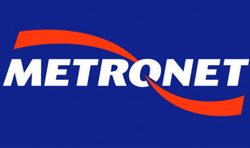 | |
| Company type | Private / consortium |
|---|---|
| Industry | Railway infrastructure |
| Founded | 1999 |
| Defunct | 2009 |
| Fate | Administration |
| Headquarters | Templar House, High Holborn, London |
Key people |
|
Number of employees | approx. 6,000 |
| Parent | |
Metronet Rail was an asset-management company responsible for the maintenance, renewal and upgrade of the infrastructure, including track, trains, signals, civils work and stations, on several London Underground lines. It was one of two infrastructure companies (the other being Tube Lines Ltd) in a public-private partnership (PPP) with the Underground.
Metronet was founded in 1999 as a consortium of several private companies to bid for a PPP, the British Government having signaled its intention to transfer such activity from the public sector, although the bidding process was protracted by political disagreements.[1] Metronet emerged as the successful bidder for two 30-year contracts covering various tube and sub-surface lines; starting in 2003, it was responsible for the maintenance, renewal, and upgrade of the infrastructure (track, trains, tunnels, signals, and stations) on a total of nine Underground lines.[2][3] To encourage high reliability rates, financial deductions were incurred for poor performance at twice the rate of increase in revenue for improved performance.[4][5]
The PPP arrangement was closely scrutinised by the British government; by early 2005, both the House of Commons Transport Select Committee and the Public Accounts Committee were criticising the opaque nature of the PPP as well as questioning the value for money in comparison to a publicly run investment programme.[6][7] In August 2004, Metronet was declared at fault for a May 2004 derailment at White City. In April 2005, the chief executive of Metronet was sacked following complaints that it had made £50 million profit despite being behind on all its major works. During November 2006, Metronet were heavily criticised by the Office of Rail Regulation (ORR) over their performance from 2003 to 2006. In July 2007, the company admitted that it may have caused a Central Line train derailment near Mile End.
Following financial difficulties, the company was placed in administration during July 2007.[8] In May 2008, the company's responsibilities were transferred back into public ownership under the authority of Transport for London (TfL).[9][2] In June 2009, the National Audit Office estimated that the failure of the Metronet PPP contract cost the taxpayer up to £410 million, adding that "most of the blame for Metronet's collapse lay with the consortium itself."[10] The company was wound up in December 2009.[11] After TfL opted to buy out the Tube Lines consortium in 2010, all Underground infrastructure maintenance was thereafter managed in-house.
- ^ Cite error: The named reference
building 2001was invoked but never defined (see the help page). - ^ a b "Metronet's takeover is complete". BBC News. 27 May 2008. Retrieved 7 March 2021.
- ^ "Metronet Brochure 2005" (PDF). Metronet. 2005. Archived from the original (PDF) on 31 October 2006. Retrieved 7 March 2021.
- ^ Cite error: The named reference
:0was invoked but never defined (see the help page). - ^ Cite error: The named reference
finalstampwas invoked but never defined (see the help page). - ^ Cite error: The named reference
PAC2005-p92was invoked but never defined (see the help page). - ^ Cite error: The named reference
transport select2005was invoked but never defined (see the help page). - ^ "Metronet calls in administrators". BBC News. 18 July 2007. Retrieved 7 March 2021.
- ^ Wright, Robert (1 April 2008). "Metronet resolves contract dispute". Financial Times. Retrieved 7 March 2020.
- ^ "Metronet failure cost taxpayer upto £410m". Contract Journal. Archived from the original on 15 June 2009.
- ^ . The London Gazette. 11 November 2009. p. 19523.
{{cite news}}: Missing or empty|title=(help)